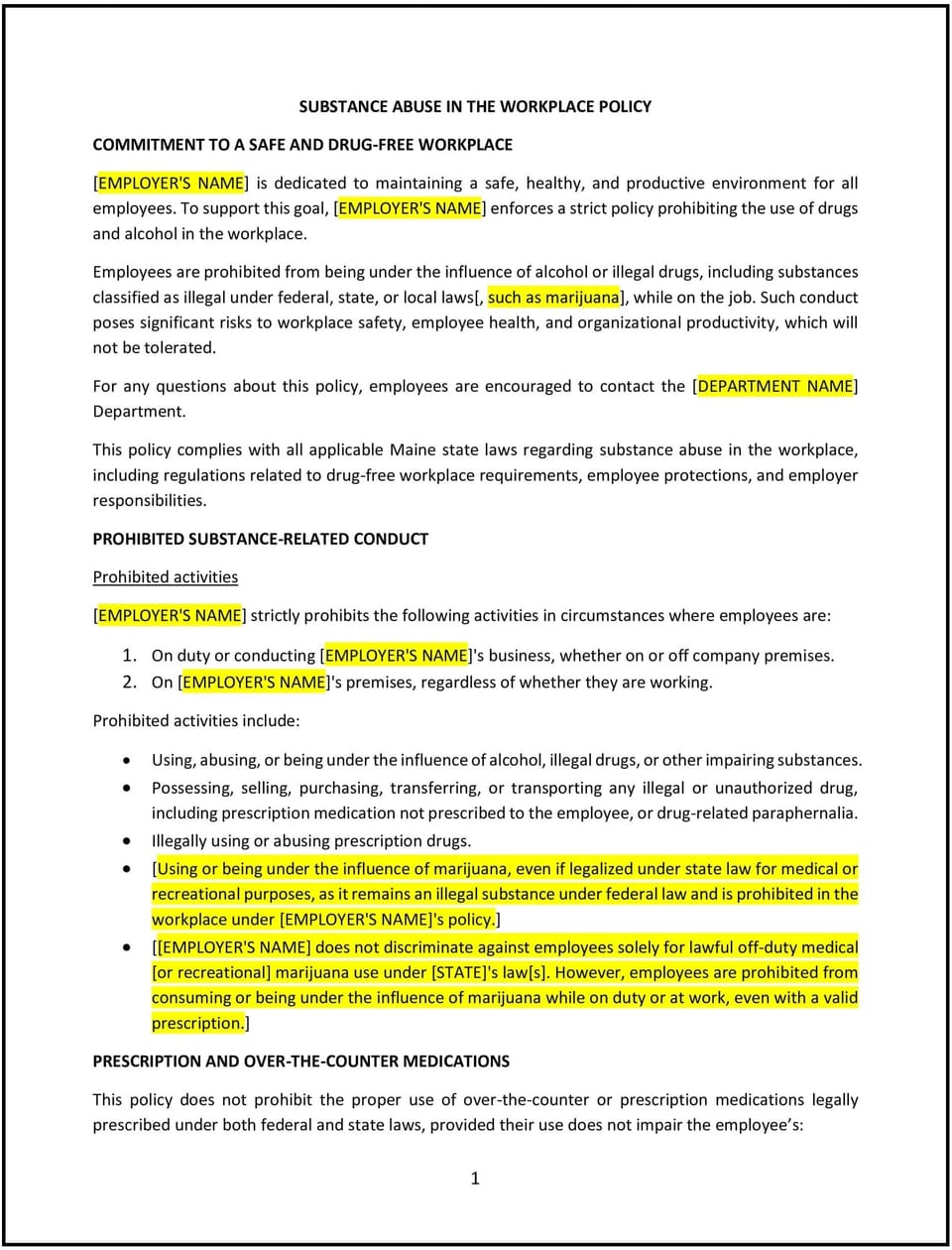Substance abuse in the workplace policy (Maine): Free template

Substance abuse in the workplace policy (Maine): Free template
This substance abuse in the workplace policy is designed to help Maine businesses maintain a safe and productive work environment by addressing the use, possession, and abuse of drugs and alcohol in the workplace. It outlines the company’s expectations for employee behavior, the steps taken to prevent substance abuse, and the procedures for handling violations of the policy.
By implementing this policy, Maine businesses can minimize the risk of accidents, reduce liability, and support compliance with state and federal regulations regarding substance abuse in the workplace.
How to use this substance abuse in the workplace policy (Maine)
- Define prohibited substances: Clearly identify the substances that are prohibited in the workplace, including alcohol, illegal drugs, prescription drugs used without a prescription, and any other controlled substances.
- Set expectations for behavior: Establish that employees are expected to be fit for duty and refrain from being under the influence of substances during work hours, on company property, or while performing work-related tasks.
- Outline testing procedures: Specify whether drug and alcohol testing will be conducted, the circumstances under which testing may occur (e.g., pre-employment, random, post-incident), and the types of tests used.
- Address support and rehabilitation: Offer support for employees with substance abuse issues, including access to counseling, employee assistance programs (EAPs), or referrals to rehabilitation programs, while maintaining workplace productivity.
- Explain consequences for violations: Clearly outline the disciplinary actions that will be taken in the event of a policy violation, ranging from warnings to termination, depending on the severity of the issue.
- Ensure confidentiality: Ensure that any information regarding substance abuse issues or testing is handled with confidentiality, respecting employees’ privacy rights.
- Review regularly: Update the policy periodically to reflect changes in Maine state laws, federal regulations, or company practices.
Benefits of using this substance abuse in the workplace policy (Maine)
Implementing this policy provides several benefits for Maine businesses:
- Promotes a safe workplace: Reduces the risk of accidents, injuries, and incidents caused by substance abuse, ensuring the health and safety of all employees.
- Enhances productivity: Ensures that employees are performing at their best by preventing the negative effects of substance abuse on job performance.
- Supports employee well-being: Provides resources for employees struggling with substance abuse, offering them a chance to seek help and improve their health and job performance.
- Minimizes legal risk: Helps businesses comply with Maine state laws and federal regulations, reducing the risk of legal liability related to substance abuse in the workplace.
- Strengthens company culture: Creates a professional and supportive work environment by maintaining high standards of conduct and offering assistance to employees in need.
Tips for using this substance abuse in the workplace policy (Maine)
- Communicate the policy: Ensure that the policy is clearly communicated to all employees, including during onboarding and through the employee handbook, so that everyone is aware of the rules and expectations.
- Train managers: Provide training for managers and supervisors on recognizing signs of substance abuse, conducting tests, and how to handle situations involving substance abuse appropriately.
- Offer support: Make sure employees are aware of available support services, such as EAPs, counseling, and rehabilitation programs, and that they feel comfortable seeking help when needed.
- Enforce consistently: Apply the policy consistently across all employees, ensuring that disciplinary actions are fair and appropriate for the severity of the violation.
- Stay compliant: Regularly review changes in Maine and federal regulations regarding substance abuse in the workplace to ensure the policy remains compliant and up to date.
Q: What substances are prohibited under this policy?
A: The policy prohibits the use, possession, and being under the influence of illegal drugs, alcohol, and any prescription medications used without a prescription or not in accordance with the prescribed instructions.
Q: When can employees be tested for substance abuse?
A: Employees may be tested in specific circumstances, including pre-employment, random testing, post-incident, or when there is reasonable suspicion that an employee is under the influence while at work.
Q: What happens if an employee is found to be under the influence at work?
A: Employees found to be under the influence of prohibited substances may face disciplinary action, ranging from warnings to termination, depending on the severity of the violation and company policy.
Q: Does the company offer support for employees with substance abuse issues?
A: Yes, the company provides access to counseling, employee assistance programs (EAPs), and referrals to rehabilitation programs for employees seeking help with substance abuse issues.
Q: How is confidentiality handled with substance abuse-related issues?
A: All substance abuse-related information, including test results and treatment information, is handled confidentially and in compliance with privacy regulations, ensuring employees' rights are respected.
Q: Can employees return to work after treatment for substance abuse?
A: Employees who successfully complete a rehabilitation program may be allowed to return to work, depending on the company’s policies and their ability to meet job performance expectations.
Q: How often should businesses review their substance abuse policy?
A: Businesses should review the policy annually or whenever there are updates to Maine state laws, federal regulations, or changes in company practices related to substance abuse in the workplace.
This article contains general legal information and does not contain legal advice. Cobrief is not a law firm or a substitute for an attorney or law firm. The law is complex and changes often. For legal advice, please ask a lawyer.


